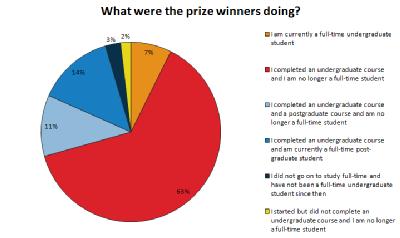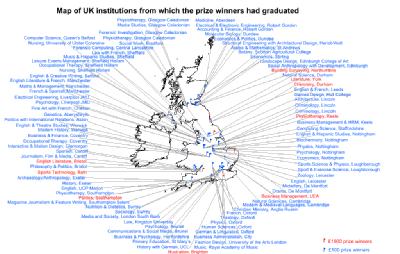Wave 4
The winners list reminds us that we are not simply looking at UK graduates, but at UK 2005/06 HE applicants...
We’ve been able to contact nearly all 110 winners. Women predominate (66%: 34% - Futuretrack cohort women were more likely than their male peers to complete and submit the questionnaire), with winners from diverse ethnic backgrounds, including Ashkenazi Jewish, Bangladeshi, Chinese and Indian Asian, Black African and Caribbean as well as from other mixed backgrounds. The average (median) age was 24, but 21% were 26 or over at the time of the survey, including five people aged 40 or over.
Of those who had completed undergraduate courses, around 43% (39) were in STEM type subjects including Architecture, 31% in the Arts and Humanities and a further 25% (22) in the Social Sciences including Education. Four had completed combined subject degrees such as Business and Psychology, or Fine Art with French Studies. Have a look at the map below to see the wide variety of subjects and places where the winnners studied.
Click on the images below to enlarge them.
| What were the prize winners doing? | Where did they study? |
 |
 |
| What subjects did they study? | Where were they from? |
 |
 |
In addition to those who graduated from their first degrees, prize winners not shown on the map include 8 current undergraduates; 3 people who did not enter full-time HE (current occupations: Strategy Consultant, Police Officer and Unemployed); 2 people who started full-time HE but did not complete their courses (current occupations: Refuse worker, Self-employed Architect); and 2 people who graduated from universities abroad: (Biology, George Washington University, USA; Electrical Engineering, Ecole Polytechnique Federale de Lausanne, Switzerland).
Every week we will feature a couple of accounts from the prize winners who got in touch. Their comments give a fascinating insight into the varied experiences of the Futuretrackers.
Male graduate in Social Studies, Old university, South West
'I am now working as a development officer for [a non-departmental public body]. This came about while I was working in Adult Community Services in [Local] County Council. I graduated from my MA Archaeology in January, and while grateful for having a job at all, Adult Community Services has no direct heritage bearing and my job there was administration which is what I attended University to get away from! I received jobs bulletins from the Institute for Archaeology (IFA) and set a goal for myself to apply for two jobs a week more suitable to my studies. I was called to interview in March by the [public body] and offered the job straight away, and have now been in post for about seven weeks.
I am very happy to be at the [current place of work]; I wanted to work in field archaeology but the work is so volatile that you are not guaranteed work from one week to the next so having a position, even a fixed term for one year like this one, allows some stability and financial planning. I am working within the heritage field and while I am doing some admin, this is only part of the job which is mainly providing advice following enquiries and meeting potential applicants and encouraging their projects.
The opportunities in [my university] are perhaps not quite what they could be, but I am happy with my choices for personal reasons. I was offered a BA place by [another old] University which academically would have been better, as their department is bigger than [my university]. The status of the [other univeristy's] archaeology department would also have provided better career opportunities as well. However, my family are in [the South West] and I had lived away for twenty years, and so I took the opportunity to move closer to my family by moving to [the city of my university].
[With the winnings, I will] Pay off some bank charges. Maybe even go into credit.
I have made the most of the opportunities available, but it was difficult being a mature student as the opportunities seemed to be very youth driven and mature students wanting to change their careers (like me) were not really supported or encouraged, by the university or by employers. However, I found that the experience of University added new skills in research, public speaking, and subject specific experience (I was part of the University's public archaeology program where I met some of the groups I work with now).
Overall, higher education provides some of the tools needed for subsequent employment, but I was already employable before my degree and perhaps skills I previously picked up in the work environment are possibly not absorbed from academic study.'
Female graduate in Biological Sciences, Old University, Scotland
‘I’ve just graduated from a PhD in life sciences, and I’m moving away from life sciences. About half-way through my PhD I realised that lab work is not really for me and that I prefer to work more with people rather than spend all day in the laboratory. At the moment I’m looking for a job, so I’m unemployed. I’ve applied to several places but haven’t heard back yet, so I’m still looking for and applying for jobs. I’m taking a bit of time to decide what I want to do.
I’m happy that I decided to continue doing my PhD and that I’ve done it now, and I’m also happy that I decided to change, I couldn’t see myself doing the same thing again.
I’m not sure I was fully aware of all my opportunities at the time of starting my PhD. And I’m not really happy with the choices I made; in retrospect I would have probably chosen a different subject or different topic to study. With hindsight I could have changed a lot of things.Because I’m unemployed, the Futuretrack winnings really all went on paying bills and the like, it was quite a needed financial help!
Higher education in Britain is quite different from what I expected; there’s a lot of independence given to the student, and it’s not quite like that in my home country, so was really very different from what I’ve experienced before. A lot of things took me by surprise and I wasn’t really prepared. But there was quite a lot of support from university careers services in terms of finding employment, help with CVs. Although in my case because I haven’t made up my mind as to exactly what I want to do it’s a bit more difficult [in terms of career advice], but if I had decided to follow my degree course it would have been much easier. So in that respect my experience exceeded my expectations and there was quite a lot of help available.'
